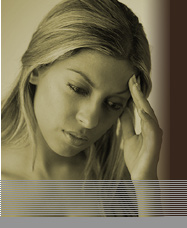Non-Prescription Alternatives
Complementary and Alternative Medicine for Anxiety, Depression, ADHD / ADD and Related Emotional Disturbances
Complementary and alternative medicine use is very popular in the United States and abroad. A recent survey found that over 40% of US consumers used a complementary therapy over the course of the last year. These therapies include, but are not limited to, herbal supplements, high dose vitamins, amino acids and fish oils.
Most consumers using alternative therapies used them for chronic, rather than life-threatening medical conditions that include:
- Anxiety
- Chronic Fatigue
- Chronic Pain
- Headaches
- Depression
- Overall Mental Health
In recent years, numerous clinical studies and observations have been performed in response to the overwhelming use of herbal therapies for mental health related conditions such as anxiety, panic attacks, social anxiety, depression, ADD, ADHD and related emotional disturbances. A brief summary of the most studied and widely used constituents can be found below. For expanded reviews, clinical trials and safety information,
St. Johns Wort (Hyperforin and Hypericin) St. Johns Wort is the most widely used mood enhancing single herb preparation on the market. The active phytochemicals in SJW, hyperforin and hypericin, are believed to be responsible for its anti-depressive effects. Meta-Analysis of clinical trials involving hundreds of patients suggests that St. Johns Wort may be effective in helping to support depressed mood and mood fluctuations by maintaining the balance of key neurotransmitters in the brain including Serotonin, Norepinephrine, Dopamine and GABA.
Kava Kava Kava Root's effects are often compared to standard sedatives due to its unique action on the CNS (Central Nervous System). The body absorbs Kava Kava very quickly, which helps to provide fast-acting natural sedation, making Kava, along with St. Johns Wort, one of the most popular anxiety herbs on the market. The initial effects begin with a relaxed, more sociable state of mind and a heightening of the senses.
A recent meta-analysis of clinical studies found Kava Kava to be more effective than placebo for helping to relieve anxiety related symptoms and also indicated that Kava Kava extract was as effective in relieving generalized anxiety disorder as the popular prescription drug Buspirone.
Valerian Root Valerian root is known for its direct sedative effect on the Central Nervous System (CNS) and is commonly used as a calming agent for helping to reduce headaches, feelings of nervousness and difficulty sleeping.
According to numerous clinical trials, the results of taking Valerian for one to thirty days are mild sedation and a decrease in feelings of anxiety, nervousness, and an improved overall sleep quality. The sedative activity on the central nervous system is largely ascribed to the valepotriate and sesquiterpene constituents of the root.
5-HTP The first large-scale clinical trial using 5-HTP in depression was conducted in 1972. Patients with unipolar and bipolar depression were given daily oral dosages of 5HTP from 50 mg to 300 mg. Significant improvement in symptoms was observed in 69% of patients and no significant side effects were reported. Though most herbal preparations may need to be used consistently for 4 to 8 weeks to see effective results, the response rate in most of the patients taking 5-HTP was quite rapid and occurred in less than two weeks.
This trial has been subsequently reinforced by additional clinical studies that show 5-HTP may be an effective treatment alternative for symptoms related to depression.
B Vitamins - B1, B3, B5, B6, B9 and B12
The B-complex of vitamins are essential nutrients required for proper mental function and overall health. Deficiencies in B-vitamins may cause symptoms related to anxiety and depression and include fatigue, sleep difficulty, stress, nervousness, anxiety and depressive states.
Clinical trials and scientific studies involving the mechanisms of action in B-vitamins show them to play key roles in neurotransmitter synthesis and are essential to maintain balanced levels of Serotonin, Norepinephrine, Dopamine, GABA and Acetylcholine.
Zinc Zinc is an essential mineral that is found in almost every cell of the human body. Depression has been directly connected with low blood-zinc levels in the body. This has been confirmed by numerous clinical studies. Though further studies involving zinc supplementation in depressed patients are currently underway, the current data suggest that zinc has a strong possibility of possessing anti-depressant activity and may be a beneficial supplement for those currently taking anti-depressants for depression related emotional disturbances.
In April, 2004, researchers performed a double-blind, placebo controlled clinical trial assessing the role of zinc in ADHD. The study demonstrated that zinc as a supplementary medication might also be beneficial in the treatment of children with attention deficit hyperactivity disorder.
Magnesium Clinical study and open trials suggest that lowered serum levels of magnesium may be partially responsible for symptoms such as anxiety, hyper-emotionality, fatigue, headaches, insomnia, light-headedness, dizziness and nervous fits. A recent clinical study provided daily magnesium supplementation to children with a deficiency of magnesium in the blood and who were classified as having ADHD syndrome according to the DSM IV. After six (6) months of supplementation, magnesium levels in the children increased. As a result, the children showed a significant decline in symptoms of hyperactivity / ADHD.
Bacopa Bacopa is commonly known as a calming agent that may reduce feelings of nervousness, stress and other emotional disturbances associated with anxiety related conditions. Clinical study has also shown Bacopa to help significantly improve insomnia, headaches, irritability and mental fatigue.
Bacopa may help to boost memory retention of new information, logical memory and other forms of learning in adults and children.
Ginseng Medical research has recently begun to investigate the benefits that the ginseng herb may offer. While additional clinical study data is still needed, a 2002 study assessed patients who took regular daily doses of ginseng over an 8 week period. After 4 weeks of ginseng therapy, the study found that patient scores improved in social functioning and mental health.
Ginseng may help to improve cognitive function related to mental arithmetic, memory quality, response time, accuracy and general memory improvement. In a study involving children, Ginseng in a combination therapy helped to reduce hyperactive-impulsivity scores in children with ADHD. |


